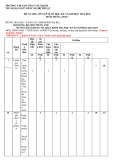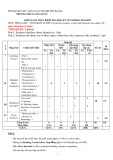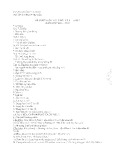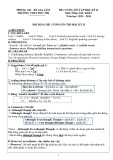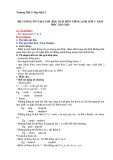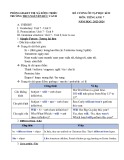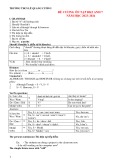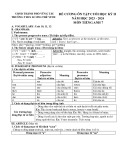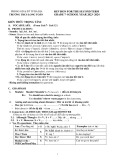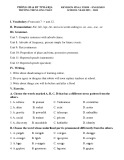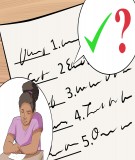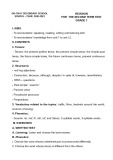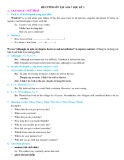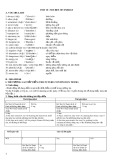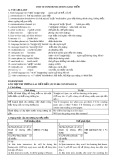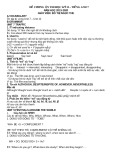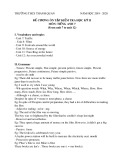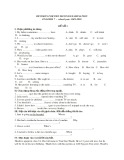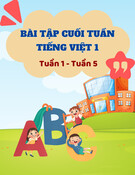UNIT 10 : SOURES OF ENERGY
A. VOCABULARY
ɔː ɪ / ' lwe z /: ɒ ə / ' f( )n /: ʌ ả
/:
ệ ɪ ɛ ɔ ɪ ɪ
ɪˈɑː ksa d /: khí CO2 ự ậ
ə ʒ / 'en d i /: / 'haidrou /: ə ɔ ạ ượ c
ụ ồ ớ ạ i 1. always (Adj) 2. often (Adj) ɪ 3. sometimes (Adj) / 's m.ta mz /: / 'nev /: ə 4. never (Adj) ɪ ə ʃ ʊə 5. take a shower (n) / te k a ɪ ə 6. distance (n) / 'd st( )ns /: 7. transport (n) / trans'p rt /: 8. electricity (n) /, l k'tr s ti /: 9. biogas (n) /'baiou,gæs/: ʊ ɪ 10. footprint (n) / 'f tpr nt /: ʊ ə 11. solar (Adj) / 'so l r /: ɑː ə 12. carbon dioxide (n) / 'k rb n da ɡə ɪ 13. negative (Adj) / 'ne t v /: ɔ ə ə :n tiv /: 14. alternative (Adj) / :l't ʒ ə 15. dangerous (Adj) / 'deind r s /: 16. energy (n) 17. hydro (n) 18. nonrenewable (adj) / ,n n ri'nju: bl /: 19. plentiful (Adj) / 'plentifl /: 20. renewable (Adj) / ri'nju: bl /: 21. source (n) ə ɔ / s :s /: luôn luôn ngườ th ỉ th nh tho ng không bao giờ ắ ắ t m vòi t m hoa sen ả kho ng cách ươ ng ti n giao thông ph đi nệ khí sinh h cọ ế ế ấ d u v t, v t chân ặ ờ ộ ề (thu c v ) m t tr i ɪ ấ x u, tiêu c c\ ọ ể ự có th l a ch n thay cho v t khác nguy hi mể ngượ năng l ộ ề ướ c thu c v n ụ ồ không ph c h i, không tái t o đ ồ phong phú, d i dào ph c h i, làm m i l ngu nồ
Ễ Ế NG LAI TI P DI N (THE FUTURE CONTINUOUS TENSE)
ụ ể ươ ễ ể ạ ộ ộ ờ ng lai. i m t th i đi m c th trong t ố ờ ẽ ả ạ , chúng tôi s đang nh y múa t i
ứ ủ ễ ế ng lai ti p di n B. GRAMMAR ƯƠ I. THÌ T 1. Cách dùng ẽ Hành đ ng s đang di n ra t ụ Ví d : Tonight at 11p.m., we will be dancing at the party. (T i nay lúc 11 gi ữ ệ b a ti c.) ạ 2. D ng th c c a thì t ể
ị
ươ ẳ Th kh ng đ nh
ể ủ ị Th ph đ nh
ừ
ừ
Will be Ving
Will not/ won’t be Ving
s ít/ ượ c s ừ ố
s ít/ ượ c s ừ ố
ờ
ấ ẽ
ề
ậ
ọ ẽ
ọ
i mai, h s không đang lau d n nhà)
ờ ố t
ờ
ầ
này tu n
ớ
ấ ẽ
ệ
ờ
I ừ ố He/ She/ It/ Danh t ế Danh t không đ m đ You/ We/ They/ Danh t nhi uề Ví d :ụ At this time tomorrow, he will be doing his homework. (Gi này ngày mai anh y s đang làm bài t p v nhà) At this time next week, I will be going to France.(Gi ẽ sau, tôi s đang đi t
i Pháp)
này tháng sau, cô y s không đang làm vi c
ừ ố He/ She/ It/ Danh t ế Danh t không đ m đ You/ We/ They/ Danh t nhi uề Ví d : ụ At 9p.m. tomorrow, they won’t be cleaning their house. (Lúc 9 gi At this time next month, she won’t be working for this company.(Gi cho công ty này n a.)ữ
ể
ấ
ả ờ
ắ
Th nghi v n
Câu tr l
i ng n
Will
I
Yes,
I
will
be Ving
He/ She/ It/ Danh ừ ừ ố s ít/ Danh t t ượ ế c không đ m đ
He/ She/ It/ Danh ừ ừ ố s ít/ Danh t t ượ ế c không đ m đ
1
No,
Won’t
You/ We/ They/ ề ừ ố s nhi u Danh t
You/ We/ They/ ề ừ ố s nhi u Danh t
ấ ẽ
ờ
ứ
này ngày mai ch ?)
ạ ẽ
ố
i vào lúc 6 gi
i mai à?)
ờ ố t
Ví d :ụ Will she be singing at this time tomorrow? (Cô y s đang hát vào gi Yes, she will. / No, she won’t Will you be having dinner at 6p.m. tomorrow? (B n s đang ăn t Yes, I will. / No, I won’t
ậ ấ
ừ ỉ ờ ữ ế ố ch th i gian: At hour from now (1 ti ng n a), tonight at…(t i nay lúc….), at this ờ ầ này tu n/ tháng/ năm sau)…
ế ệ 3. D u hi u nh n bi t ạ Trong câu có các tr ng t time next week/ month/ year (Gi C.EXERCISES
TEST 1 UNIT 10
I.
Put the words in the table in the correct column according to their stress pattern.
II.
Choose a word in each line that has different stress pattern.
1. A. atmosphere 2. A. constancy 3. A. unfortunate 4. A. recommend 5. A. confident 6. A. motorbike 7. A improvement 8. A. seriously B. plentiful B. sympathy B. continuous B. abundant B. memorable B. generate B. different B. personally C. effective C. generous C. renewable C. solution C. excited C. advantage C. develop C. carefully D. natural D. suspicious D. artificial D. increasing D. interested D. atmosphere D. enormous D. correctly
III.
Choose a word in each line that has different stress pattern.
1. A. different 2. A. dangerous 3. A. incapable 4. A. development 5. A. interfere 6. A. attraction 7. A. changeable 8. A. important B. serious B. countryside B. sincere B. satisfaction B. convenient B. humorous B. dioxide B. plentiful C. effective C. energy C. loyalty C. population C. referee C. acquaintance C. countryside C. familiar D. regular D. volunteer D. success D. education D. cigarette D. unselfish D. natural D. convenience
IV.
Find the word which has a different sound in the underlined part.
1. A. wants 2. A. transport 3. A. listened 4. A. many 5. A. blood B. helps B. power B. enjoyed B. carbon B. spoon C. plays C. report C. decided C. large C. noon D. looks D. short D. played D. hard D. tool
V.
Find the word which has a different sound in the underlined part.
1. A. hydroelectric 2. A. pleasure 3. A. plentiful 4. A. few 5. A. nuclear B. environment B. feed B. electric B. knew B. truck C. solar C. heat C. renewable C. new C. abundant D. biogas D. meat D. energy D. sew D. dump
VI.
Choose the best one (A, B, C or D) to complete the sentence or replace the underlined word. 1. Nuclear energy is , but it is dangerous. A. renewable B. nonrenewable C. natural resource D. fossil fuel
2
2. Fossil fuels are very common in our society but they the environment. D. provide B. pollute A. waste 3. All the houses in our village will be A. frozen B. widened C. renew by solar energy. C. heated D. heightened 4. Several governments try to the use of fossil fuels. A. waste C. reduce D. increase B. save 5. At this time next week, we a wind turbine in our garden. A. will installed B. will be installing C. install D. installed 6. Low energy light bulbs should be used to electricity. B. save C. spend D. buy 7. C. cars D. taxis 8. “Why is it called a source?” “Because it can be replaced easily and quickly.” A. convert It is a good idea to use when travelling long distances. B. public transport A. private cars B. nonrenewable A. renewable C. effective D. specific 9. We must the amount of water our family use every day. A. lessen B. narrow C. lower D. reduce 10. Wave energy is a source of energy.
A. environmental friendly C. environment friendly B. environmentally friendliness D. environmentally friendly 11. Alternative sources of energy developed in the near future. B. will be C. is D. was cooking in the kitchen at 7 PM tomorrow. A. has been 12. She A. will B. is C. will be D. be 13. Some new energysaving bulbs in the dining room. A. will be put B. will put be C. will put D. will be putting 14. What should we do to electricity? A. take B. save C. cut D. waste 15. The wind, the sun, and the wave are some types of sources of energy.
VII.
(study) at 8.00 tomorrow. (wait) for her when her plane arrives tonight? (have) dinner then. (wear) when she arrives? I
(arrive) in Ha Noi around March. (lie) on the beach.
Put the verbs in brackets in the correct tense forms to complete the sentences. 1. I 2. You 3. Don’t phone me between 7 and 8. We 4. What clothes do you think she (send) in my application tomorrow. 5. 6. Linda 7. Next week at this time, you 8. My uncle can’t come to your party tomorrow night because he 9. You 10. At this time tomorrow evening, I (work) at night. (meet) your former teachers at 9 a.m. tomorrow morning, won’t you? (play) computer games in my bedroom. C. changeable D. alternative B. costly
VIII.
A. cheap Turn into passive. 1. Students will use public transport to go to school. →...................................................................................................................................... 2. Solar power will generate a great deal of electricity this summer. →...................................................................................................................................... 3. Will they install the solar panels on the roof of the house tomorrow? →...................................................................................................................................... 4. Local people won’t burn plants to heat this winter. →...................................................................................................................................... 5. The smoke from factories will pollute the air. →...................................................................................................................................... 6. They will build a hydro power station in this area. →......................................................................................................................................
3
IX. Give the correct form of the words given to complete sentences.
and try to find out ECONOMY
1. We should use them alternative sources of power. 2. Solar energy is 3. I think that solar energy can be an , plentiful and clean. source of energy RENEW ALTER in the near future. at home.
this ELECTRICAL POWERFUL
friendly source of energy.
ENVIRONMENT TRANSPORT
or cool our houses. HOT
4. We should reduce the use of It’s a clean source of energy. Sailboats couldn’t move without 5. . 6. Waves will be used as an 7. Limit car trips by relying on biking, walking, public . 8. Solar power can be used to 9. Energy is used to 10. There will be a a lot of electrical things. of energy in the near future. PRODUCT SHORT
X.
Choose the word or phrase among A, B, C or D that best fits the blank space in the following passage. In Western countries, electricity, gas, and water are not (1) but necessities. Companies now that will not only work effectively, (3) realize that consumers want (2) save money. For most North American households, lighting (4)
for 10 percent to 15 percent of the electricity (5) . However, this amount can be (6) by replacing an ordinary 100watt light bulb with an energysaving bulb. These bulbs use a (7) of the electricity of standard . Therefore, consumers can save about US$7 to US$21 per bulb. In bulbs and last eight times (8) Europe, there is a labeling scheme for refrigerators, freezers, washing machines and tumble dryers. The label tells the consumers how much energy efficiency each model has, compared (9) other appliances in the same category. Ultimately, these innovations will save money as well as (10) the earth’s resources 1. A. launching 2. A. tickets 3. A. but also 4. A. as good as 5. A. burnt 6. A. reduced 7. A. sent back 8. A. weightlessness 9. A. space 10. A. conserve C. coming C. spaceships C. with C. accounts C. went off C. observatories C. separated from C. wavelengths C. with C. tourists B. luxuries B. weapons B. towards B. like as B. bill B. audience B. returned to B. longer B. atmosphere B. drivers D. peaking D. products D. into D. such as D. banged D. watcher D. quarter D. length D. universe D. astronauts
XI.
Read the passage, and choose the correct answer A, B, C or D for each question. Almost all our energy comes from oil, coal, and natural gas. We call them fossil fuels. The earth’s fossil fuels are running out. What will happen when there is no oil, coal and gas on the earth? Scientists are trying to find and use other alternative sources of energy. We can use energy from the sun, the wind, and the water.
Solar energy is unlimited. The sun supplies all the energy used to grow plants, to evaporate water for rain, and to maintain the temperate of the planet. All are necessary for human life. If we are able to collect solar energy, we will be sure to have this abundant source od power. 1. From which do plants on the earth get energy? A. stars C. the moon D. the sun B. the Mars 2. What are the other words or phrase for fossil fuels? A. natural gas B. oil C. coal D. oil, gas, natural gas
. 3. Natural sources of energy are energy from B. the sun C. water A. wind D. the sun, wind, water
4
4. The word “abundant” in the passage is closet in meaning with A. plentiful B. limited C. natural . D. necessary 5. We are asking the question, “What will happen when there is no oil, coal, and gas on the earth?” .
XII.
because A. we are now depending so much on oil, coal, and natural gas B. other sources of energy can come from the sun, wind, and water C. we are looking forward to seeing great changes D. we are looking for other alternative sources of energy Read the following passage and choose the best option. It’s hard to imagine education without (1) . Without energy, people’s ability to get a decent education
. Education is acknowledged as a crucial factor in helping people escape (3)
education. A (9) for children to further their education. And teachers don’t want to is severely (2) poverty. In communities without energy children are often forced out of school to help (4) cooking (5) or earn money. When they do go to school it has to be in (6) , which restricts their hours especially as many children walk for hours to get there. When they arrive home to do their schoolwork, they have no (7) to study and all that greets them is darkness. Or they have to rely on kerosene to provide precious light, which is both expensive and dangerous; if a lamp is knocked over it can cause serious burns. Computers, radio or TV are important tools in the (8) of electricity restricts the (10) work in communities where there are no lights, little equipment, no TVs, computers or life after dark.
1. A. like 2. A. approximately 3. A. from 4. A. custom 5. A. tourists 6. A. Orbit 7. A. light 8. A. equipment 9. A. invitation 10. A. landscape B. energy B. expressively B. pioneering B. waiter B. materials B. Orbition B. designed B. tool B. lack B. departures C. such as C. affected C. pioneering C. collect C. pilot C. Orbital C. draw C. modern C. space C. islands D. similar D. progressively D. pioneers D. pill D. guess D. daylight D. painted D. furniture D. aviation D. opportunity
. XIII. Complete the second sentence in each pair so that it has similar meaning to the first sentence. 1. Governments will make more regulations to reduce industrial pollution. → More regulations ___________________________________________________ 2. People won’t burn fossil fuels for energy in the future. → Fossil fuels _______________________________________________________ 3. People will construct more wind turbines in that area to produce electricity. → More wind turbines _________________________________________________ 4. Shall we reduce our electricity bills to 20% in five months? → Will our electricity _________________________________________________ 5. People will develop alternative sources of energy. → Alternative sources ________________________________________________ 6. We will be providing electricity this time next year. → Electricity ________________________________________________________ 7. Scientists will find solutions to reduce pollution in our city. → Solutions _________________________________________________________ 8. They will increase the tax on petrol to 15% next September. → The tax __________________________________________________________ 9. With that device people will change the wave energy into electricity. → With that device the wave energy ______________________________________ 10. We shall replace ordinary 100 watt light bulls with energy saving ones. Ordinary _________________________________________________________
XIV.
→ Rewrite the sentences so that it has similar meaning as the sentence printed before, using the words given.
5
1. They will install solar panels on the roof of our house next week. → Solar panels ______________________________________________________ 2. They will build a new school for poor children next month. → A new school _____________________________________________________ 3. Will the plumber check cracks on the water pipes in two days? → Cracks ___________________________________________________________ 4. They sell these chemicals everywhere in my hometown. → These chemicals ___________________________________________________ 5. They won't show the film on types of future energy sources next Friday. → The film _________________________________________________________ 6. Some people will interview the new president on TV. → The new president __________________________________________________ 7. They will destroy the old thermal power plant at the end of this year. → The old thermal ___________________________________________________ 8. They will widen the road to our village next year. → The road _________________________________________________________ 9. We will be using biogas for cooking and heating at this time next month. → Biogas ___________________________________________________________ 10. They got the first prize at the competition. → The first __________________________________________________________
UNIT 11. TRAVELLING IN THE FUTURE
ự
ng ʒɪ ə ɪ ʒ ạ
ớ ệ ệ ệ ớ ườ ng
ượ ệ ể /: ặ ấ t trên m t đ t ộ
ươ ệ ể ằ ẩ S an toàn ễ ị ả Tho i mái, d ch u ưở ượ T ng t ự ẹ S k t xe ạ Va ch m xe, tai n n xe Nhiên li uệ thân thi n v i h sinh thái, thân thi n v i môi tr N iổ ấ ạ Th t b i ạ ộ ươ ng ti n di chuy n cá nhân tr m t lo i ph ạ ạ ộ m t lo i xe đ p có m t bánh ạ ạ đ p, bàn đ p ạ ộ m t lo i ph ể ng ti n di chuy n cá nhân b ng cách đ y chân đ ạ ầ /: əʊ ɪ
ỹ A.VOCABULARY ɪ /'se fti/: 1. safety (n) /'pleznt/: 2. pleasant (a) ɪˈ / mæd n t v/: 3. imaginative (a) ɪ /'træf k d æm/: 4. traffic jam (n) /kræ /: ʃ 5. crash (n) l/: ə /fju: 6. fuel (n) ə 7. ecofriendly (adj) /'i:k u 'frendli/: ə /fl ut/: 8. float (v) /fl p/: ɔ 9. flop (v) ɔ ə ə 10. hover scooter (n) /'h v 'sku:t ɔ /'m nouwi:l/: 11. monowheel (n) /'pedl/: 12. pedal (v,n) /'segwei/: 13. segway (n) ặ ấ ch y bánh xe trên m t đ t 14. metro (n) /'metr ʌɪ /sk tre n/: 15. skytrain (n) ɪ ɑː 16. gridlocked (adj) /'gr dl kt/: ə 17. pollution (n) 18. technology (n) ʃ ə /p 'lu: ( )n/: ɒ ə ʒ /tek'n l d i/: ệ Xe đi n ng m Tàu trên không trong thành phố ẹ ứ Giao thông k t c ng Ô nhi mễ ậ K thu t
ỉ ươ ế
ng lai (will for future prediction) ủ ữ ộ ộ ừ ế ế ầ ừ ở B. GRAMMAR ừ ộ ế I.Đ ng t khuy t thi u WILL ch t ộ ộ WILL là m t đ ng t khuy t thi u, do đó nó không c n chia theo ch ng và sau nó luôn là m t đ ng t ể ạ d ng nguyên th không có “to”
6
ề ữ ẽ ả ể ấ ộ ươ C u trúc này dùng đ nói v nh ng hành đ ng mà chúng ta nghĩ s x y ra trong t ng lai. Cách dùng
ấ C u trúc
(+)S +will + V ()S+won’t + V (?)Will +S+ V?
Ví d ụ i nay và s t nh vào ngày mai.) ươ ư ẽ ứ ế ầ ầ s r t r ng) ế ớ i tu n sau/ Đ n tu n sau ư ẽ ớ i)
ầ ẽ ẽ ạ ờ ẽ ư ố It will rain tonight and stop tomorrow.(tr i s m a t ủ ớ ẽ ấ ộ My future house will be very large. ( Ngôi nhà trong t ng lai c a t The mail won’t arrive until next week.( B c th s không đ n cho t ứ b c th s t Will the fuel price increase next month? ( Giá xăng d u s tang vào tháng sau à)
Ạ Ừ Ở Ữ ạ ừ ở ữ s h u ỉ ự ở ữ ủ ặ ộ ự ậ i ho c m t s v t khác. Đ i t ế ặ ậ ớ i ho c v t v i ng ừ ậ ạ ạ ừ ở ữ ừ ở ữ ườ s h u và danh t ườ ể theo sau đ tránh l p l i. (Đ i t s h u= tính t ạ ừ ở ữ ượ ử s h u đ c s s h u + II.Đ I T S H U (POSSESSIVE PRONOUNS) 1.Đ i t ạ ừ ở ữ Đ i t s h u ch s s h u c a ng ừ ở ữ ể ụ d ng đ thay th cho tính t danh t )ừ
ự ừ ở ữ 2. S khác bi ệ ữ ạ ừ ở ữ đ i t s h u và tính t t gi s h u .
7
ừ ở ữ ạ ừ ở ữ Tính t s h u Đ i t s h u
ể s h u( s h u ướ ứ ừ ở ữ ừ ừ ở ữ possessive adjective ) là c danh đ ch s s h u và đ ng tr . ị Đ nh nghĩa s h u và danht t ể ứ ở ị Tính t ừ ể ỉ ự ở ữ t . ừ t s h u v a có th đ ng ủ ữ ừ v trí ch ng , v a ạ ừ ở ữ ( possessive pronouns) dùng đ thay Đ i t ế ẳ th h n cho tính t ạ ừ ở ữ ừ Đ i t ữ ể có th kaf tân ng trong câu.
ể ủ Ví d ụ
s h u ừ ở ữ “my” ủ ậ ạ ừ ở ữ mine” đ thay ể ố ặ ạ i s h u “ i nói không mu n l p l ử ụ my book” vì ng This is my book.( Đây là quy n sách c a tôi) Trong câu s d ng tính t ử ụ “ ừ book” và danh t ể That is mine. ( Kia là quy n sách c a c u) Trong câu s d ng đ i t ườ ế th cho “ .ừ t
ạ ừ ở ữ nhân s h u và nghĩa c a chúng. ạ ừ ở s ừ ở s Nghĩa Ví d ụ 3. Đ i t ạ ừ Đ i t x ng ư ủ Đ i t h u ữ Tính t h u ữ
8
ủ I My Mine C a tôi ủ ạ ư ủ ể
Your book is not as interesting as mine. Quy n sách c a b n không hay nh quyên sách c a tôi.
You Your Yours ủ ạ C a b n ạ ư ạ
I will give mine and you will give yours. ủ ẽ ư Tôi s đ a cho b n cái c a tôi, còn b n đ a tôi cái ủ ạ c a b n .
We Our Ours ủ C a chúng tôi This house is ours. ủ Ngôi nhà này là c a chúng tôi.
They Their Theirs ủ ọ C a h ế ạ If you don’t have a car, you can borrow theirs. ể ượ ủ ọ ạ N u b n không có ô tô, b n có th m n c a h .
9
ủ He His His C a anh ta How can he eat my food not his? ủ ứ ể ả ấ
Sao anh y có th ăn th c ăn c a tôi mà không ph i ứ ủ c a anh ch ?
ủ ấ She Her Her C a cô y ủ ậ ấ ủ ấ I can’t find stapler so I use hers. ậ ( tôi không tìm th y cái d p ghim c a tôi vì v y tôi ử ụ s d ng cái c a cô y.)
It Its Its C a nóủ ỏ ư ủ ủ My feet are small but its are big. ( chân c a tôi nh nh ng chân c a nó thì to )
s h u
ạ ủ ư
ướ ở ạ ừ ở ữ 4. Cách dùng các đ i t ừ ở ữ ộ ế Dùng thay th cho m t tính t s h u ừ ộ ( possessive adjective ) và m t danh t c đã nói phía tr
ủ ắ
Ví dụ I gave it to my friends and to yours. ( Tôi đ a nó cho b n c a tôi ạ ủ ạ và b n c a b n) yours=your friends Her shirt is white and mine is blue. ( Áo cô ta màu tr ng còn c a tôi màu xanh.) mine= my shirt
10
ỏ ở ữ ạ ườ ạ ủ ộ i b n c a tôi. Dùng trong d ng câu h i s h u kép( double possessive) ả ỗ ủ VD: He is a friend of mine( anh ta là m t ng It was not fault of yours that we mistook the way. ( Chúng tôi l m ầ ươ đ ng đâu có ph i l i c a anh ta.)
TEST 1 UNIT 11
I.
Find the word which has a different sound in the underlined part.
1. A. dear 2. A. stupid 3. A. brother 4. A. cheer 5. A. doctor B. heart B. studio B. thick B. parachute B. hospital C. hear C. study C. they C. champagne C. pollution D. fear D. student D. that D. machine D. tomorrow
II.
Find the word which has a different sound in the underlined part.
1. A. flood 2. A. hobby 3. A. dynamite 4. A. thunder 5. A dump B. typhoon B. hour B. terrify B. earthquake B. nuclear C. groom C. humor C. deny C. gather C. bulb D. balloon D. hole D. symbol D. healthy D. plumber
III.
Choose the correct answer. I have to revise tonight because we are having/ will have an exam tomorrow. I am remembering/ will remember this day for the rest of my life!
I’m sure you are passing/ will pass your driving test. Don’t worry. If you want me to. I will complain/ am going to complain to the manager about it.
I’m a bit scared because I am seeing/ will see the dentist this afternoon.
1. 2. 3. Do you go/ Are you going to Australia next Christmas? 4. 5. 6. Oscar says he is doing/ will do the washingup after dinner. 7. 8. What are you going to do/ do you do this evening? 9. Shall you tell/ Will you tell Paul I’m sorry about yesterday? 10. My dad will grow/ is going to grow a beard, but my mum doesn’t like the idea.
IV.
hat. It’s books are here. shoes. Those are sister. That’s Choose the best one which fits the space to complete the sentence. It isn’t 1. 2. 3. These are 4. This is . (your, his) . (his, my)
V.
scarves.
. . (mine, her) are there. (ours, their) Complete the sentences. Use the correct possessive adjective or possessive pronoun. . 1. Look at my hat. This hat is cat. 2. Peter has got a cat. That’s . 3. My brothers have got bikes. The bikes are 4. You and Robbie have got scarves. These are . 5. Paul has got a kite. The kite is bag. 6. Mum has got a new bag. That’s 7. My friends and I have got sweets. The sweets are watch. 8.
VI.
I’ve got I watch. This is Supply the correct form of the word to complete the sentence.
11
of microphone. (invent) that will save money. (product) will conserve the earth’s resources. (innovate)
has gone up again. (electric)
. (friend) of water. (short) If it doesn’t rain soon, there’ll be a great is every body’s responsibility. (protect)
by solar energy. (hot) 1. We want to buy 2. These 3. D.E Huges was the 4. The price of 5. People in the countryside is 6. 7. Environmental 8. Taxi drivers have to have good 9. 10. My brother can repair electric In the future, many buildings will be on the street names. (know) very well. (apply)
VII. Complete the sentences with the correct prepositions.
the country. fiction books.
the section picture books. the busy streets.
our house.
my pen.
a big city is not so quiet as 1. Life them are fond 2. Most his topic. 3. He’s familiar bookshop and have a look 4. Let’s get walk It’s difficult 5. riding in busy streets. I’m afraid 6. I intend to buy something 7. you to help me. 8. It’s very kind 9. What are you doing? Oh, I’m looking the newcomers. 10. These boys always laugh is blue. (hers, your) pen is red. 5.
VIII.
help. you for a minute?
I agree you about most things, but not politics.
the lights when you go to bed.
Fill in the blanks with the correct prepositions to complete the sentences. If you have a problem, ask 1. 2. Can I speak 3. My children are afraid dogs. 4. This guide book is full useful information. 5. 6. Don’t worry about the baby. I’ll look her while you’re out. 7. She fell her horse and hurt her wrist. 8. Don’t forget to turn 9. Put 10. Could I try your warm coat. It’s cold today. these shoes, please? Size nine.
IX.
Read the text and fill in the blanks, use the words in the box.
Martin Halstead is only 20 but he (1) make its first flight on 14 December this year. The plane will fly (3) owns an airline company. Alpha One Airways (2) the Isle of will take about 45 minutes. Tickets
won’t get any food or drink on the flight. Will the company (7) money? Nobody knows – but most people think that Martin Halstead will be (8) one
Man (an island between England and Ireland) to Edinburg, the capital of Scotland. It won’t (4) a lot of passengers because it is a small plane. The (5) will be cheap and (6) day. X. Rewrite the sentences so that they have the same meaning as the original ones. 1. We will use renewable energy in the future.
Renewable energy ______________________________________________________ 2. This is our school.
This school is__________________________________________________________ 3. What is the distance between Vinh and Ha Noi city?
4.
How__________________________________________________________________ I often walked to school when I was a student. I used________________________________________________________________
12
5. Although they are short, they still love playing sports.
In spite of_____________________________________________________________ 6. They will use solar energy to protect the environment.
Solar energy___________________________________________________________ 7. Although she eats lots of food, she is still very slim.
In spite of_____________________________________________________________ 8. What is the distance between Hanoi and HCM city?
9.
How far_______________________________________________________________ I find English interesting. I am _________________________________________________________________ 10. Our roof will be fixed tomorrow.
XI.
They _________________________________________________________________ Rewrite the sentences so that the meaning stays the same to the first. 1. The café has a lot of tables. There _______________________________________________________ 2. Theatre programmes usually have lots of information. There is ______________________________________________________ 3. London has more than thirty theaters. There are ____________________________________________________ 4. The garden has a swimming pool. There _______________________________________________________ 5. The system has both private and state schools.
6.
7. There _______________________________________________________ I accomplished this task in three months. It took _______________________________________________________ Jane spent three hours a week sorting out stamps. Sorting out her stamps __________________________________________ 8. The pictures that are taken will have to travel for three minutes before they reach the earth. The pictures will take___________________________________________ 9. She wrote the letter in thirty minutes. It took _______________________________________________________ 10. John finished his essay in two hours.
XII.
It took _______________________________________________________ Find and correct the mistakes to complete the sentences. 1. London is a expensive city. ______________________________________________________________________ 2. He is a most intelligent student in our class. ______________________________________________________________________ 3. My father’s office are on the second floor. ______________________________________________________________________ 4. Your new car is more cheaper than John’s. ______________________________________________________________________ 5. Why does Suzie and Guy feel tired? ______________________________________________________________________ 6. He left college when he is 17. ______________________________________________________________________ 7. How long does it take you getting to school? ______________________________________________________________________ 8. Craig starts work at eight o’clock yesterday. ______________________________________________________________________
TEST 2 UNIT 11
13
I.
B. jet B. scooter B. fly
1. A. traffic B. same 2. A. let 3. A. foot 4. A. sky 5. A. vehicle B. rehearse C. crash C. vehicle C. shoot C. by C.helicopter
II.
Find the word which has a different sound in the part underlined. D. jam D. success D. food D. hymn D. perhaps Choose the word which has a different stress pattern from the others.
D. ocean
6. A. helicopter 7. A. underwater B. driverless 8. A. man 9. A. ship B. boat 10. A. driver B. pedal B. plane B. taxi C. pilotless C. sailor C. ride C. flying D. cars C. submarine D. automatic D. train D. sail
III.
Choose the correct answer. 11. People won’t use flying cars
C. during D. until A. before 12. The city is facing serious
C. pollute D. pollutant A. pollution the year 2050. B. after problems. B. polluted 13. We believe that urban transport pods can travel
B. at around 30kph. C. in D. on A. with 14. Do you think the price will increase next month?
A. fossil fuels B. gases C. fuel D. natural gases 15. We will use more energy in the future.
A. solar B. sunny C. sun D. sunlight 16. A jet pack doesn’t
A. have a lot of space. B. bring C. take D. occur 17. Which of transport do you think will be used in the future?
A. mean B. meaning C. meanings D. means 18. We are looking for types of vehicles that help us to avoid .
A. traffic C. rush hours D. walking 19. The Segway, which is a
A. twowheels C. Two wheel B. traffic jam vehicle, will be a success. B. two wheels D. twowheeled 20. Which the Segway, the driver pulls the handle to go back or pushes it to go .
B. backward C. round D. fly A. forward 21. I think we have electric taxis very soon.
A. may B. might C. will D. would 22. With teleportation, you disappear at a place, and then in another place seconds later.
A. appears B. appeared C. reappear D. reappears
.
23. Every day over 1,000 new cars add to the city and the city of over 20 million people is getting more and more A. expensive D. gridlocked C. difficult B. famous 24. My brother and I often come to school foot.
A. at C. by D. on 25. Skycycling tubes will be easy .
A. drive B. in B. to drive C. ride D. to ride 26. The white cat is Helen’s, and the black cat is .
A. my C. mine B. I 27. We try to make the future green by using vehicles or kinds of energy that are D. of mine .
A. environmentally friendly C. environmentally friendship B. environment friendly D. environmental friendly
14
.
28. This is Linda’s hat, and those shoes are B. hers A. her C. our D. their to ride a jet pack in bad weather because it doesn’t have a roof.
29. It will be A. enjoyable C. unpleasant D. comfortable
B. pleasant 30. A sky safety system can help cars to B. have A. prevent traffic jams and crashes. C. use D. take
IV.
Complete the sentences with will or will not (won’t) and a suitable verb to make them true in your
on holiday on the moon.
in cities under the sea.
on other planets. cheaper in the future. more wars in the future, and we will live in a peaceful world. until they are over one hundred. more traffic than now.
opinion. In ten years people 1. 2. One day people 3. Flying 4. People in the future 5. There 6. In twenty years’ time, there 7. Our children and grandchildren 8. Driverless cars 9. Flying cars that can change into helicopters 10. Future planes cheap so that many people can afford them. a runway to take off. faster than the speed of sound.
V.
Choose the correct completion in the brackets. Is this (your/ yours) pen? .
hat. Here. hat. (My/ mine) is green.
Don’t forget (your/ yours) No, that’s not (my/ mine) Please take this wood carving as a present from me. Here you are. It’s (your/ yours)
1. 2. Please give this dictionary to Mary. It’s (her/ hers) 3. A: B: 4. A: .
Thank you. Isn’t that the Smith’s car? That one over there. The blue one. No, that’s not (their/ theirs) . (Their/ Theirs) car is dark B: 5. A: B: blue.
VI.
Choose the correct completion in the brackets. new bicycle. It is very light and fast. How do you
1. A: Nick really likes (his/ him) like (your/ yours)
B: (My / mine) is cheap, but it’s very reliable. 2. A: Excuse me. Is this (your/ yours) umbrella? .
3. A: When do (your/ yours) B: I don’t have an umbrella. Ask Ken. Perhaps it is (him/ his) classes begin? ? When do (your/ yours) B: September 2nd. How about (your/ yours)
(My/ Mine) begin? A: begin on August 23rd. spaghetti sauce is delicious! 4. A: Mary, (your/ yours) .
is much better. It tastes as good as Anna’s is too salty.
B: Thank you, but it’s not as good as (your/ yours) A: Oh, no. (Your/ Yours) B: Do you like Anna’s spaghetti sauce? I think (her/ hers) mother makes goods spaghetti sauce too. (Her/ Hers)
A: Maybe. (My/ Mine) is thick and rich. B: In truth, making spaghetti sauce is easy, but everyone’s sauce is just a little different.
VII.
Complete the sentences with the words or phrases in the box.
15
.” a bike when I was six the taxi and gave the driver the address of his hotel “Are you going by train?” “No, I’m
the bus at the wrong bus top, so he walked from these to school.
. ? ? the boat between the rocks.
I learned to 1. 2. David 3. 4. Tom 5. She has to 6. Cycling is my favourite form of 7. Do you know how to fasten your 8. Wouldn’t it be quicker to go by 9. He managed to 10. I was stuck in 11. A red truck was home through the park.
VIII.
thousands of miles every year for her job. for an hour yesterday. Complete the sentences with will or won’t. In a few years everyone In the future people know how to use the Internet. go to school or university. They study
take their jobs one day. speak English. In a few years, everyone become the global language in the near future; it is English as far 1. 2. at home using their computer. 3. Some teachers are worried that computers 4. 5. Chinese as I know.
IX.
Complete the conversation with the correct form of the verb in brackets.
I don’t know
a great time. We (2. eat)
good better Linda: Do you want to go on holiday to Viet Nam with me? Susan: Linda: Come on. We (1. have) food. We (3. meet) and we (5. not spend) a lot of nice people. Your Vietnamese (4. get) a lot of money.
It (6. not rain) and we (7. go) to Ha Noi and we (8. buy) some
I think we (9. enjoy) beautiful landscapes in Viet Nam. pho and other traditional Viet Nam dishes. Susan: Well … Linda: cool clothes. Susan: Linda: And we (10. try)
X.
Read the text and answer the following questions.
Up, up and away!
Martin Halstead is only 19, but he already owns an airline owns an airline company. Alpha One Airways will make its first flight on 14 December this year. The plane will fly from the Isle of Man (an island between England and Ireland) to Edinburgh, the capital of Scotland. It won’t carry a lot of passengers because it is a small plane. The journey will take about 45 minutes. Tickets will be cheap and passengers won’t get any food or drink on the flight. Will the company make money? Nobody knows – but most people think that Martin Halstead will be successful one day. 1. When will Alpha One Airways make its first flight? _____________________________________________________________________________ 2. Where will the plane fly from? _____________________________________________________________________________ 3. Where will it fly to? _____________________________________________________________________________ 4. Will it carry a lot of passengers? Why or why not? _____________________________________________________________________________ 5. How long will the journey take? _____________________________________________________________________________ 6. Will the passengers get any food or drink?
XI.
_____________________________________________________________________________ Read the text and answer the following questions.
16
It is a computer drawing of the plane of the future. British engineers and scientists have published plans for a new hypersonic plane called the A2. It will be very fast. At the moment, a flight from London in the UK to Sydney in Australia takes about twentyone hours but with the A2 the same flight will take around four hours. The flight will fly at 4,500 kilometres per hour and will fly at an altitude of over 10,000 metres.
It will carry 300 passengers but it don’t have any windows because scientists haven’t found glass that is strong enough. It will be better for the environment than other planes because the engines won’t produce gases that cause pollution.
In the future, will people travel from London to Australia for the weekend? It’s possible! Both how much will a ticket cost? The planners say that it won’t be very expensive – about £2,000. The A2 will be ready for its first flight in 2020. 1. How long does it take the A2 plane to fly from London to Sydney? _____________________________________________________________________________ 2. What is the speed of the plane? _____________________________________________________________________________ 3. What is the altitude of the flight? _____________________________________________________________________________ 4. How many passengers can it carry? _____________________________________________________________________________ 5. How much does a ticket for the flight from London to Sydney cost?
XII.
_____________________________________________________________________________ Read the following passage, and then tick the correct answers: true (T), or false (F). ‘Sky Whale’ is a plane with four engines that can carries over 700 people. The airplane will exist for short distances between cities. The technology will use ecoengines with energy recovery systems which are able to feed back to the planes themselves. With a capacity to transport a large number of passengers, like a train of high speed, ‘Sky Whale’ will be a safer type of planes for the future.
We will also have supersonic planes which are transcontinental or transoceanic. They can fly at very high altitudes more than 30,000 metres and at record speeds. The engines which can change according to the situations are called intelligent engines.
True False ‘Sky Whale’ can carry a large number of passengers.
‘Sky Whale’ can travel at a high speed. 1. 2. The airplane will be used for long distances between cities because it has four engines. 3. 4. Transcontinental planes can fly at the maximum altitude of 3,000 metres and at record
5.
XIII.
speeds. Intelligent engines are the ones that can change according to the situations. Read the text and answer the following questions. AeroMobil is a beautiful flying car. It can be changed very quickly from a car to a plane only about minutes, and it can give you freedom to move. AeroMobil is a flying car that can use roads for cars and runways for planes. As a car, it can fit in any standard parking space, use regular gasoline, and can be used in road traffic just like any other car. As a plane, it can use airport in the world, but can also take off and land using any grass trip or paved surface just a new hundred meters long. 1. What is AeroMobil? _______________________________________________________________________________ 2. What can it give you? _______________________________________________________________________________ 3. How long does it take AeroMobil to change from a car to a plane? _______________________________________________________________________________ 4. What characteristics does AeroMobil have as a car? _______________________________________________________________________________ 5. When can AeroMobil take off or land besides an airport?
17
XIV.
_______________________________________________________________________________ Write a short paragraph about a future means of transport, using the cues given.
Driverless cabs
1. Computercontrolled pods/ take/ you/ wherever/ you/ want along a fixed route/ whenever/ want/ go. _______________________________________________________________________________ 2. People/ ride/ speed of 25mph.
_______________________________________________________________________________ 3. There/ be little wait/ for use/ the cabs/ will leave from stations/ and/ be accessed/ by prepaid smartcards. _______________________________________________________________________________ _______________________________________________________________________________
4. The cabs/ which/ travel/ a 1.5mwide track/ use 75% less energy per passenger/ a car/ and/ 50% less/ a bus.
_______________________________________________________________________________ _______________________________________________________________________________ 5. They/ already test/ 160 driverless cabs/ since 2006/ and/ many investors/ politicians/ support/ the idea. _______________________________________________________________________________
_______________________________________________________________________________
UNIT 12: AN OVERCROWDED WORLD Ế Ớ Ộ (M T TH GI I QUÁ ĐÔNG ĐÚC)
A. VOCABULARY
ưở ng
ố
ự ủ ế ə 'fekt/: / ɑ /bl :k/: ʃ /t i:t/: /kraim/: /'krimin l/: ə /'densiti/: /dai'v :s/: ə /i'fekt/: Ʒ ə /iks'plou n/: ɑ /fli:'m :kit/: ʌɳ ə g r/: /'h r/: ʤə /'mei ệ ʃə ng ə /'meg siti/:
ổ ộ chu t
ộ ả ộ Tác đ ng, nh h Gây ùn t cắ ừ ả L a đ o ạ ộ T i ph m ẻ ộ ạ K t i ph m ậ ộ M t đ dân s Đa d ngạ K t quế ả Bùng nổ ợ ờ Ch tr i S đói khát ớ Chính, ch y u, l n ưỡ B nh suy dinh d Thành ph l nố ớ Quá đông đúc ự S nghèo đói ộ ổ chu t Khu ở ẻ ố K s ng khu Không gian R ng rãi 1. affect (v) 2. block (v) 3. cheat (v) 4. crime (n) 5. criminal (n) 6. density (n) 7. diverse (adj) 8. effect (n) 9. explosion (n) 10. flea market (n) 11. hunger (n) 12. major (adj) 13. malnutrition (n) /,mælnju:'tri n/: 14. megacity (n) 15. overcrowded (Adj) /,ouv 'kraudid/: 16. poverty (n) 17. slum (n) 18. slumdog (n) 19. space (n) 20. spacious (Adj) ə ɔ ə /'p v ti/: ʌ /sl m/: ɔ ʌ /sl md g/: /speis/: ʃə /'spei s/:
B. GRAMMAR I.
Ề Ố ƯỢ Ớ NG V I “MORE/LESS/FEWER”(COMPARISONS OF
SO SÁNH V S L QUANTIFIERS) ừ ượ ề ơ ơ ơ
ng t ề ạ
1. Các l “more/less/fewer” (nhi u h n/ ít h n/ ít h n) ơ ủ ơ More (nhi u h n): là d ng so sánh h n c a “many” và “much”.
18
ơ ổ ủ ế
ề ậ ơ ượ ể
c dùng đ so ố ượ ậ ế Less, fewer (ít h n): “less” là bi n đ i c a “little”, còn “fewer” là bi n đ i c a “few”. ố ượ ể ng v t này nhi u h n v t kia, còn “fewer” và “less” đ “more” dùng đ so sánh s l ậ ơ sánh s l ổ ủ ậ ng v t này ít h n v t kia.
ừ
+ than+…
ề
ơ
ượ
ố ớ
ề
ạ
ơ
ố
ố
ộ
…+ more+ danh t VD: The countryside has more trees than a big city. (Vùng quê có nhi u cây h n thành ph l n.) This city has more traffic than that one. (Thành ph này có xe c đi l
i nhi u h n thành ph kia.)
ừ ế
ấ 2. C u trúc ừ ế So sánh (Danh t đ m ừ ượ không c và danh t đ ế đ m đ c)
ượ ố
ừ ế
đ m
c s nhi u (s/es) + than+…
đ m đ
So sánh kém (Danh t c)ượ đ
ố ớ
ề …+ fewer + danh t VD: The countryside has fewer problems trees than a big city. (Vùng quê có ít v n ấ ề ơ đ h n thành ph l n)
ượ
ừ
ế
ừ
không đ m đ
ượ
ế
So sánh kém (Danh t không đ m đ
c)
c + than+… ơ ề
ạ
…+ less + danh t VD: I have less money than you. (Tôi có ít ti n h n b n)
Ỏ CÂU H I ĐUÔI (TAG QUESTIONS)
ậ ứ
ố
ằ
ầ
ấ
ẩ
ị
ắ
ỏ
ượ
c thêm vào cu i câu tr n thu t, đ ng đ ng sau d u ph y.
ấ
ạ
ả
ấ
ả
ộ
ả
ị Đ nh nghĩa
1. Đ nh nghĩa và cách dùng ộ ỏ Câu h i đuôi là m t câu h i ng n, đ Ví d :ụ You like mushrooms, don’t you? (B n thích n m ph i không?) He isn’t a doctor, is he? ả (Anh y không ph i là m t bác sĩ ph i không?) It’s a table, isn’t it? ộ (Nó là m t cái bàn ph i không?)
19
ủ
ộ
Cách dùng
ỏ Trong văn nói, ý nghĩa c a câu h i đuôi tùy thu c vào cách di n đ t. ỏ
ạ ậ ự ặ
ố
ỏ
ở
ỉ
ườ
ọ
ễ câu h i đuôi thì có nghĩa là không th t s đ t câu h i, ch mu n ng
i nghe
ọ
ỏ
ỏ
ố ế N u xu ng gi ng ồ ớ đ ng ý v i mình. ở ế N u lên gi ng
ự ự câu h i đuôi, thì đó là câu h i th c s .
ỏ ươ ứ ề ầ ớ ậ 2. Cách thành l p câu h i đuôi t ậ ệ ng ng v i các m nh đ tr n thu t
ấ
C u trúc
Auxiliary/ To be/ Modal verb (not) + Subject
ư
ợ ộ
Trong đó
ừ
ừ tobe: am/ is/ are, was/were
ừ
ế
ế
ư khuy t thi u) nh can, could, must… ư
ộ ủ ữ
Auxiliary(tr đ ng t ) nh do/ dose/did, have/has ộ Đ ng t Modal verb (đ ng t Subject (ch ng ) nh he, she, it…
ị
ậ
ầ
ế
ỏ
ả ở ể ủ ị
ng
th ph đ nh.
ứ
ườ
ủ ị
ọ
ng đ
ườ Tr h p 1ợ
ả
ọ
She is reading book, isn’t she? (Cô y đang đ c sách, ph i không?) ế
ể
ả
ố
t, ph i không?)
ể
ả
ế ơ
ị
ẳ N u câu tr n thu t là câu kh ng đ nh, câu h i đuôi ph i ượ Hình th c ph đ nh th c rút g n (not = n’t) Ví d :ụ ấ Mr. Nam can speak English well, can’t he? (Ông Nam có th nói ti ng Anh t
ọ They did the test yesterday, didn’t they? (H đã làm bài ki m tra vào hôm qua ph i không?) ủ ạ Your sister can swim, can’t she? (Ch gái c a b n bi
ả t b i, ph i không?)
20
ầ
ậ
ỏ
ủ ị
ả ở ể
ị
ng
ẳ th kh ng đ nh.
ườ Tr h p 2ợ
ả
ọ
ả ố ở
ố ẹ
ệ ở
ế N u câu tr n thu t là câu ph đ nh, câu h i đuôi ph i Ví d :ụ
công ty này,
ả
ả
ả
ọ
Nga isn’t a student, is she? (Nga không ph i là h c sinh, ph i không?) ả đây, ph i không?) I shouldn’t smoke here, should I? (Tôi không nên hút thu c ấ Her parents don’t work in this company, do they? (B m cô y không làm vi c ph i không?) They don’t have to go to school, do they? (H không ph i đi t
ớ ườ i tr
ng ph i không?)
ầ
ợ ộ
ậ
ừ ặ ộ
ừ
ợ ộ
ừ
ho c đ ng t
to be thì tr đ ng t
này đ
ượ ặ ạ c l p l
i trong câu
Chú ý
ế N u trong câu tr n thu t có tr đ ng t ỏ h i đuôi. Ví d :ụ
She was a writer,wasn’t she?
Miss Lan will go to Ho Chi Minh next month, won’t she?
They didn’t meet him last night, did they?
ế
ợ ộ
ậ
ừ
ợ ộ
ừ ươ ứ
ủ
ầ
ậ
ớ
, dùng tr đ ng t
ư ng ng v i thì c a câu tr n thu t nh
t
ầ N u câu tr n thu t không có tr đ ng t do/ dose/did, have/has…
He lives in Hanoi city, doesn’t he? You came here, didn’t you? They watch TV every evening, don’t they?
ỏ
ủ
ế
ẫ
ụ
ả ả
ư Câu h i đuôi c a I am là aren’t I nh ng n u là I am nôt thì v n dùng am I? Ví d : I am wrong, aren’t I? (Tôi sai, ph i không?) I’m not wrong, am I? (Tôi không sai, ph i không)
ườ Tr ng ợ ặ h p đ c tệ bi
ồ
ầ
ậ ở
iả ờ
ớ
ậ
trên. ầ câu tr n thu t.
Câu tr l ố ớ đ i v i ạ d ng câu ỏ h i đuôi
ả ờ ố ớ
ả ờ
ầ
ỏ
ủ ị
i Yes/No trong câu tr l
i đ i v i câu h i ph đ nh.
ả
ơ
ế ớ Yes n u đ ng ý v i câu tr n thu t ế ở ồ ế No n u không đ ng ý v i ý ki n Ví d :ụ Your sister is married, isn’t she? Yes, she has just married./ No, of couse she isn’t. Tuy nhiên, c n chú ý câu tr l Ví d :ụ ạ You’re not going out today, are you? (Hôm nay b n không đi ch i ph i không?) Yes. (=Yes, I am going out) Có. (Có, tôi có đi ch i)ơ No. (No, I am not going out) Không. (= Không, tôi không đi ch i)ơ
ậ ỏ
3. Các b
ề ừ ừ ộ ế ộ ừ có trong câu: đ ng t ừ ườ th ế khuy t thi u hay đ ng t to be. ộ ng, đ ng t ủ ị ề ẳ ị ỏ ủ ị ị ẳ ủ ị ệ ệ ề ề ẳ ỏ ế ầ trong câu h i đuôi n u c n. ướ ướ ướ ế ế ướ ướ ổ ạ ừ ộ ướ ầ ượ c l n l t thành l p câu h i đuôi ệ ủ ị B c 1: Xác đ nh thì c a m nh đ chính. ạ ộ ị B c 2: Xác đ nh lo i đ ng t ệ ị B c 3: Xác đ nh m nh đ chính là câu kh ng đ nh hay ph đ nh. ị N u m nh đ chính là câu kh ng đ nh câu h i đuôi là câu ph đ nh. N u m nh đ chính là câu ph đ nh câu h i đuôi là câu kh ng đ nh. ỏ B c 4: Thay đ i đ i t ụ D i đây là m t vài ví d :
21
ầ
ủ ị ị
ầ ỏ
ẳ
ẳ ủ ị
ỏ
ậ Câu tr n thu t ph đ nh, câu h i đuôi kh ng đ nh.
ị ậ Câu tr n thu t kh ng đ nh, câu h i đuôi ph đ nh.
You aren’t a teacher, are you?
You are a student, aren’t you?
He isn’t crazy, is he?
He is very busy, isn’t he?
They weren’t late, were they?
They were surprised, weren’t they?
22
You don’t speak French, do you?
You speak English, don’t you?
You haven’t been here all week, have you?
You have studied all week, haven’t you?
You won’t fail the exam, will you?
You will pass the exam, won’t you?
She can’t drive a car, can she?
She can speak two languages can’t she?
23
We mustn’t say anything, must we?
We must be patient, mustn’t we?
TEST 1 UNIT 12
I.
Choose a word in each line that has different stress pattern.
1. A. disease 2. A. agriculture 3. A. nutrition 4. A. consider 5. A. economic B. service B. industrial B. consider B. industry B. community C. standard C. behavior C. experience C. million C. population D. tourist D. economy D. atmosphere D. density D. overcrowded
II.
Choose a word in each line that has different stress pattern.
1. A. megacity 2. A. enough 3. A. peaceful 4. A. physician 5. A. homeless B. education B. affect B. labour B. criminal B. violence C. overcrowded C. narrow C. diverse C. average C. skyscraper D. malnutrition D. require D. wealthy D. skyscraper D. describe
III.
Find the word which has a different sound in the underlined part.
1. A. density 2. A. sugar 3. A. fact 4. A. spacious 5. A. decrease B. countryside B. slum B. place B. delicious B. healthcare C. reason C. cutting C. malnutrition C. social C. sea D. list D. luck D. traffic D. decision D. disease
IV.
Choose the best one (A, B, C or D) to complete the sentences. 1. The children can read English, A. can’t they B. can they D. they can’t 2. Overcrowded places have a lot of problems, A. doesn’t it B. have they ? C. they can ? C. don’t they 3. The immigrants will hardly find accommodation in the city, A. will it C. will they B. won’t it 4. Disease spreads more quickly in overcrowded areas, D. does they ? D. won’t they ? D. does it C. isn’t it A. doesn’t it
B. is it ? 5. Your brother’s here, B. are he C. isn’t he D. aren’t he A. is he people live in a small lace, life can be very difficult. 6. When A. too much B. too many C. a few D. few 7. Living in the country is healthier than that in the city because in the countryside, there is
traffic. A. more C. Higher D. fewer
B. less ? 8. Tom didn’t see her, B. did he A. did Tom C. do Tom D. does he in wealthy areas. 9. Children in the slums have more diseases than C. them B. Ø A. those 10. People move to the city with the hope that they can get D. that food and better healthcare.
24
D. bigger B. fewer
V.
A. less C. more Choose the best one (A, B, C or D) to complete the sentence or replace the underlined word. 1. Don’t leave anything behind, ? A. do you B. don’t you D. shall we C. will you both the rich and the poor. 2. Overpopulation problems B. affect A. happen D. reduce 3. Rio de Janeiro is a very culturally A. different C. cause city. C. diverse D. diversity
B. same ? 4. That isn’t Bill driving, B. isn’t it C. is that D. isn’t that 5. A. is it I think in the future cities will be more crowded and the traffic will get A. good C. worst B. well 6. The major cause of death for children living in the slums is . D. worse . D. malnutrition C. immigration A. density 7. Susan doesn’t like oysters, ? D. she does A. did she 8. Diseases D. spread C. move 9. B. illiteracy B. does she C. doesn’t she more quickly in overcrowded areas. B. travel in the city. Some rich people live in large villas, while many poor people live in
A. come It’s very small slums. A. diverse C. spacious D. healthy
B. equal 10. Mary wasn’t angry, ? B. is she A. was she D. was Mary
C. wasn’t she 11. In Manila, over 30% of the population lives in . C. crops A. poverty D. shortage B. schooling 12. Some poor people may crime when they need money. A. involve B. arrive C. commit D. accept 13. Your grandfather was a millionaire, ? A. was he D. isn’t she B. is he 14. Everyone is ready for the game, A. aren’t they C. wasn’t he ? C. is it D. isn’t it 15. The city has to find to homeless people immediately. B. is there B. systems D. solutions C. calories
VI.
A. earnings The word at the end of each of the following sentences can be used to form a word that fits suitably in the blank.
TEMPERATE .
SHORT . the people sleeping in HOME
1. The first symptom of the disease is a very high 2. The long hot summer has led to serious water 3. To have hundreds of streets of a rich city like London is a crime. 4. Average 5. We lived in rented for skilled workers are rising. before buying this EARN ACCOMMODATE house. 6. Drought has many countries in Africa after a AFFECT long period of dry weather. or PEACE
others GROW POPULAR MEDICINE 7. Nuclear power can be used for military purposes. 8. The government is trying to limit population . 9. A megacity is a very large city with big . care to 10. Healthcare workers who offer are some of the lowest paid people in the country.
25
VII.
Complete each of the following sentences with a correct question tag. ? I think that is an overcrowded bus, ? ? ? It isn’t ready yet, ? ? I am clever, ? ? ? ?
VIII.
1. Mr. White is a tailor, 2. 3. Mr. Vinh is a teacher, 4. Your grandparents don’t prefer living in the city, 5. 6. The tourists will never be allowed to visit the slums again, 7. 8. He’s unable to solve that problem alone, 9. We must hurry, 10. Dai Dong used to be a fishing village with only three thousand people, Complete each of the following sentences with a correct question tag. ? ? ? ? ? ? ? ? ? 1. They won’t stop long, 2. His brother has lived in Jakarta for more than ten years, 3. You asked for mustard, 4. These houses cannot provide enough accommodation, 5. He speaks too quickly, 6. Your sister works for a big foreign company in the city, 7. He will arrive soon, 8. There were nearly one million people living in this city in 2010, 9. The milk may be sour, 10. We shouldn’t go to those streets when it turns dark, ?
IX. Add question tags to the following statements.
? 1. Baird didn’t produce the first TV picture before 1920, ? ? 2. There are many interesting programs tonight, 3. Linh didn’t feel confident in her favorite clothes, ? ? 4. The two cities are not the same in some ways, ? 5. Her listening isn’t excellent, 6. Maryam couldn’t stay for longer time, ? ? 7. My sister has to make this room tidy, 8. This poet has mentioned the Ao Dai in poems, ? 9. Lan used to walk past the mosque on her way to primary school, 10. Nobody wrote poems yesterday, ?
X.
Fill in each blank with fewer, less, more or some.
money than my close friend.
homework.
countries than Mai. money. free time than this year. minutes and try to call her again. pollution than the city. patience than Nam. 1. Minh has 2. So far I’ve saved water than me. 3. She drinks 4. Phong has visited 5. They give me 6. Next year, we will have 7. She has 8. Let’s wait for 9. We prefer living in the countryside because it has 10. There used to be unemployed people in this city five years ago.
XI.
Fill in the blank with a suitable word in the blanket.
Overpopulation is an undesirable condition where the number of existing human population (1) by a number of factors such as reduced the carrying capacity of Earth. Overpopulation is (2) mortality rate, (3)
medical facilities, and depletion of precious resources. The effects of overpopulation are quite severe. One of these is rise in unemployment. When a country (4) to overpopulated, it gives rise to unemployment as there are (5) jobs
26
as people will steal support a large number of people. Rise in unemployment gives rise to (6) various items to feed their family and (7)
demand and supply continues to of various commodities including food, to survive and feed their
them basic amenities of life. High cost of living is another effect. As difference (8) expand due to overpopulation, it raises the (9) shelter and healthcare. This means that people have to pay (10) families. XII. Read the text carefully, and then answer the question below.
Mumbai, which is located in the western coast of India, is the capital of Maharashtra state. It is home to Bollywood, the centre of Hindu movie industry, and the film “Slumdog Millionaire” was based there. Poor people have to live in slums. In the slum, people have to live with many problems. People have to go to the toilets in the streets and there are open sewers. Children play among sewage wastes and doctors deal with 4,000 cases of death a day because of lack of hygiene.
Next to the open sewers are water pipes which can crack and take in sewage. Dharavi slum is based around this area. There are toxic wastes in the slum including hugely dangerous heavy metals. Dharavi is made of 12 different neighbourhoods and there are no maps or road signs. The further you walk into Dharavi from the edge, the more crowded area becomes. People live in very small slums, often with many members of their extended families. 1. Where are the toilets in the slum? ______________________________________________________________________ 2. Where is Mumbai?
3. ______________________________________________________________________ Is Mumbai famous for the film industry? Why or why not? ______________________________________________________________________ 4. How many neighbourhoods are there in Dharavi? ______________________________________________________________________ 5. What happens to water pipes in Dharavi? ______________________________________________________________________
XIII. Read the following passage and answer the questions below.
The Philippines has one of the fastest growing populations in Southeast Asia. From having fifty million inhabitants in 1980, the Philippines today is home to around ninetyeight million people with 12 million living in Manila only.
Manila, the Philippine capital, is one of the most overpopulated places on earth. There are few other areas where so many people live so closely together: On average there are 66,140 people per square kilometer, but in some slum regions there are as many as 90,000 people living per square kilometer.
The world overpopulation is a growing and complex problem. But for the residents of Manila the result is quite simple. They are running out of space. Families live in homemade shacks built in cemeteries, of between railroad tracks or under bridges. They live wherever they can find some space. Even the city’s toxic garbage dumps are home to people who eat, sleep and live surrounded by rotting trash. With so many residents, the city’s resources are strained to the limit. Large parts of Manila’s 12 million residents lack clean drinking water, work, and access to healthcare and education. 1. What is the average density in manila? ______________________________________________________________________ 2. What do most of manila’s residents lack? ______________________________________________________________________ 3. What was the population of the Philippines in 1980? ______________________________________________________________________ 4. Where do homeless people in manila live? ______________________________________________________________________ 5. How many inhabitants are there in manila?
XIV.
1. Rewrite the following sentences, beginning as shown, so that the meaning stays the same. Jakarta doesn’t have as many skyscrapers as Shanghai. → ................................................................................................................ Shanghai 2. You forgot to turn off the T.V last night, didn’t you?
27
→ You didn’t remember .............................................................................................? 3. The countryside doesn’t suffer as much pollution as the city. ..................................................................................................... The countryside 4. → I think you should go to work by bike. → Who don’t ..............................................................................................................? 5. New York has more billionaires than Tokyo. → Tokyo .................................................................................................................... 6. We will plant more trees along this street. → More trees .............................................................................................................. 7. Does overpopulation cause a lot of social problems in this area? .....................................................................................................? Overpopulation 8. → Is pollution the most serious problem? → Pollution is .............................................................................................................? 9. A group of foreigners visited the slums last week, didn’t they? Did→ .........................................................................................................................? 10. Mr Lam lived in the country when he was a child. → Mr Lam used
.......................................................................................................... TEST 2 UNIT 12
I.
Find the word which has a different sound in the part underlined.
1. A. healthcare 2. A. malnutrition 3. A. slum 4. A. social 5. A. reason B. disease B. traffic B. cutting B. decision B. list D. sea D. place D. luck D. delicious D. countryside
II.
C. decrease C. fact C. sugar C. spacious C. density Choose the word which has a different stress pattern from the others.
6. A. million 7. A. skyscraper 8. A. diverse 9. A. overcrowded 10. A. industrial B. density B. describe B. wealthy B. malnutrition B. behaviour C. consider C. homeless C. peaceful C. megacity C. agriculture D. industry D. violence D. labour D. education D. economy
III.
Choose the correct answer. 11. Rio de Janeiro is a very culturally
A. diverse city. B. diversity C. different D. same 12. The schoolyard is very small, so there isn’t enough for students to play in.
C. space D. ground B. land more quickly in overcrowded areas.
A. rooms 13. Diseases A. move C. come D. travel B. spread 14. In Manila, over 30% of the population lives in .
A. crops B. shortage D. schooling 15. Children in the slums have more diseases than
A. them C. poverty in wealthy areas. C. those D.
B. that . 16. People move to big cities for a better B. Standard living A. standard of living C. standard life D. life of standard 17. When people live in a small place, life can be very difficult.
C. too much D. too many A. a few 18. Everyone is ready for the game,
B. few ? B. Isn’t he C. aren’t they D. is there A. is it 19. Overcrowded places have a lot of problems, ?
B. does it C. doesn’t it D. have they A. don’t they 20. People living in the slums never get good healthcare,
B. don’t they ? C. are they D. aren’t they A. do they
28
IV.
Complete the sentences with the words or phrases in the box.
because they
.
of Dharavi.
is one of the country’s most pressing social problems. and comfortable. , over six thousand/ km2. each year. is an outdoor market that sells secondhand goods at low prices. . 1. There are million of people in that African country who are living in have no jobs. 2. There has been a shortage of food for a long time because of failure of crops and people are suffering from 3. 4. She was brought up in the 5. The hotel rooms are 6. In Africa many people die of 7. Hong Kong has a high population 8. A 9. The government has had to take measures to stop the population in many developing countries is low. 10. The
V.
Match the word or phrase with their meaning and write the answer in each blank.
A B Answer s
1. slump
A. the number of people in a place in relation to its area 2. overpopulation
B. a market usually held outdoors
29
3. overcrowded
C. a very large city, typically one with a population of over 10 million 4. malnutrition
D. the sudden increase in the number of people in the country or in the world 5. poverty
E. an area of a city where living conditions are extremely bad 6. megacity
F. with too many people
30
7. destiny
G. large in size 8. spacious
H. the state of having very little money 9. flea market
10. population explosion I. a situation in which too many people live in a certain area J. bad health that is the result of not having enough food
VI.
Complete the sentences with the words or phrases in the box.
is a very high temperature. .
for skilled workers are rising. before buying this house. 1. The first symptom of the 2. The long hot summer has led to serious water 3. To have hundreds of homeless people sleeping in the streets of a rich city like London is a 4. Average 5. We lived in rented 6. has affected many countries in Africa a long period of dry weather.
31
or military purposes. . is a very large city with big population.
7. Nuclear power can be used for 8. The government is trying to limit population 9. A workers who offer medical care to others are some of the lowest paid people in 10. the country.
VII.
exercises this evening. work tonight.
hours than Hoa a day. money on books than Nam. money than us. letters home. time playing computer games. days off than anyone in the factory.
Fill in each blank with fewer or less. 1. Ba works 2. Ba spends 3. They are very tired. They can do I am very tired, too. I will do 4. 5. They get 6. Hoa likes her new life in Ha Noi now. She writes 7. You should spend 8. They have 9. Lan drinks 10. There are water than Hoa a day. trees along the streets in the new town.
VIII.
Fill in each blank with the correct word: more, fewer or less.
places where people can smoke. hours than any workers.
workers than any workers. time off than workers. Farmers work harder than workers.
cars in the streets at this time. The traffic is so heavy. students than
homework than Hoa. fruits are now in season in the south. There are plenty of fruits now. 1. The weather in winter is worse than that in summer. People get colds in summer than in winter. 2. The new law limits smoking in public. There are 3. We are lucky. We work 4. This factory has 5. Farmers have 6. There are 7. Class 7A has 42 students, and Class B has only 38 students. Class 7A has Class 7B. 8. Lan has 9. 10. I think we don’t have many publish holidays. We ought to have .
IX.
?
? ?
Jeju Island looks very peaceful, I think a megacity is a very large city with big population,
X.
Put a tag question at the end of the sentences. In big cities, life can become very difficult and unpleasant, 1. ? 2. The world will soon become overpopulated, 3. The number of English speakers is increasing very quickly, 4. ? 5. ? 6. You have never watched any films made in Bollywood, 7. Some people commit crime when they have no money and no food, ? 8. You enjoy living in a peaceful neighbourhood, ? ? 9. The factory will bring more jobs to local people, 10. You forgot to bring textbooks this morning, ? Put a tag question at the end of the sentences. ? It’s hot today, ?
1. You don’t like pollution, ? 2. 3. You’re waiting for your letter, ? 4. We had a good time, ? 5. You won’t tell anyone, 6. We don’t have to go yet, ? 7. You haven’t gone to Rio de Janeiro, ? 8. They didn’t like the film, ? ? 9. The idea can change the situation, 10. You need and EnglishVietnamese dictionary, ?
XI.
Read the following passage, and then tick the correct answers: true (T), or false (F).
32
Thousands of people in Calcutta, India, have no jobs and no proper homes. They live in homes made of mats, boxes, and rusty sheets of tin. Many people have to camp permanently in the railway stations, cooking, eating, sleeping and feeding their babies there. Babies are born in the streets and people die there too.
As many as seventeen out of every hundred families live in the streets, having nowhere to go. Many of these people are sick because of a hot and damp climate. Although the government tries hard to provide houses, schools, and medical services, it can hardly keep up with the increasing population.
True False 1. Many people in Calcutta live in bad conditions because they have no jobs. 2. Many people live in slums made of anything they can find. 3. Babies from poor families are taken care of by the local government. 4. Seventy percent of the families in Calcutta have to live in the streets. 5. The local government makes efforts to help poor families but it cannot solve the
XII.
problem successfully. Read the text and answer the questions below. Modern cities all over the world face the same problems. One of them is poor housing. People often live in old houses or huts that don’t have electricity or sanitation. As city population grow, governments don’t have the money to build modern apartment buildings. Cars and industries are polluting city air and rivers more and more. Waste that people throw away is burned or ends up in landfills. All of this makes modern cities an unhealthy place to live in. Especially during morning and evening rush hours cities become packed with vehicles. Daily traffic jams make it impossible for people to get to work in time. City authorities are spending more and more money on public transportation and are taking other steps to reduce traffic in cities.
Cities of today face many social problems. Crime, alcoholism, and drug addiction is especially high in cities. Many young people are unemployed. Government organizations work hard to get rid of poverty. They try to give such people better education and jobs. 1. Where do poor people live in cities? _____________________________________________________________________________ 2. Why can’t governments solve the problem of poor housing? _____________________________________________________________________________ 3. What makes modern cities an unhealthy place to live in? _____________________________________________________________________________ 4. What are social problems that many cities face nowadays? _____________________________________________________________________________ 5. What do government organizations try to do? _____________________________________________________________________________
XIII.Read the following passage, and then tick the correct answers: true (T), or false (F).
The population of the world has increased more in modern times than in all other ages of history. The world’s population was about 500 million in 1650. It doubled in the period from 1650 to 1850. In 1986, the population was more than three billion. Estimates based on research by the United Nations in the same year showed that it would be more than 7.5 billion by 2020.
True False
1. The world’s population increase in modern times has been greater than ever before. 2. The world’s population was over a billion in 1850. 3. The United Nations carried out the research in 1850. 4. The world’s population in 1986 was three times as big as that in 1850. 5. The world’s population would be more than seven and a half billion by 2020.
XIV.Read the text and answer the questions below.
Mumbai, which is located on the western coast of India, is the capital of Maharashtra state. It is home to Bollywood, the centre of Hindu movie industry, and the film “Slumdog Millionaire” was based there. Poor people have to live in slums. In the slum, people have to live with many problems. People have to go to the
33
toilets in the streets and there are open sewers. Children play among sewage wastes and doctors deal with 4,000 cases of death a day because of lack of hygiene.
Next to the open sewers are water pipes which can crack and take in sewage. Dharavi slum is based around this area. There are toxic wastes in the slum including hugely dangerous heavy metals. Dharavi is made of 12 different neighbourhoods and there are no maps or road signs. The further you walk into Dharavi from the edge, the more crowded the area becomes. People live in very small slums, often with many members of their extended families.
1. Where is Mumbai? _____________________________________________________________________________ 2. What is its function in Maharashtra state?
3. _____________________________________________________________________________ Is Mumbai famous for the film industry? Why or not why? _____________________________________________________________________________ 4. What is the setting for the film “Slumdog Millionaire”? _____________________________________________________________________________ 5. Where are the toilets in the slum? _____________________________________________________________________________ 6. What is the effect of open sewers? _____________________________________________________________________________ 7. What happens to water pipes in Dharavi? _____________________________________________________________________________ 8. How polluted is it in Dharavi? _____________________________________________________________________________ 9. How many neighbourhoods are there in Dharavi? _____________________________________________________________________________ 10. What happens when you go further into the slum? _____________________________________________________________________________
XV. Write a short paragraph about the population of Mumbai, using the cues given.
1. Mumbai/ one/ most populated cities/ world.
_____________________________________________________________________________ 2. Population/ Mumba/ over 12.7 million/ population density/ 20,482 people/ per square kilometer. _____________________________________________________________________________ _____________________________________________________________________________ 3. Like other big cities/ India/ population of Mumbai/ grow/ rapidly/ last 20 years. _____________________________________________________________________________ 4. A large majority/ Mumbai’s population/ migrants/ other states/ India. _____________________________________________________________________________ 5. A large number/ people/ Mumbai/ live/ the slums/ other residential areas.
_____________________________________________________________________________ XVI.Write a short paragraph about the population change in Ho Chi Minh city over the past 30 years, using
the cues given. 1. Ho Chi Minh City/ largest city/ Viet Nam.
2.
_____________________________________________________________________________ 1979/ only 3.4 million/ 10 years later/ only 4 million/ because/ economy/ not/ develop much. _____________________________________________________________________________ _____________________________________________________________________________ 3. Renovation policy/ start/ 1989/ next decade/ dramatic increase/ population/ figure/ over 5 million.
_____________________________________________________________________________ _____________________________________________________________________________
4. With economic growth/ living standard/ Ho Chi Minh City/ higher / other regions/ so/ many people/ look for/ jobs.
34
_____________________________________________________________________________ _____________________________________________________________________________ 5. Ho Chi Minh City/ biggest city/ population/ over 7 million in 2009/ now about 8 million. _____________________________________________________________________________
TEST FOR UNIT 10,11,12
I.
Find the word which has a different sound in the part underlined.
B. wood B. house B. heat B. travel B. shoot 1. A. flood 2. A. overcrowded 3. A. health 4. A. pavement 5. A. footprint D. cook D. town D. seat D. transport D. toothache
II.
D. hotel
C. book C. country C. meat C. imagine C. smooth Choose the word which has a different stress pattern from the others. C. future C. uncomfortable D. celebration C. renewable D. abundantly C. malnutrition D. intelligent C. traffic B. chimney B. population B. environment B. supersonic B. comfort 6. A. petrol 7. A. overcrowded 8. A. ecofriendly 9. A. underwater 10. A. spacious D. resource
III.
Choose the correct answer.
16. Driverless cars have already B.travelled D.existed 17.
A.gone If I have a jet pack. I will use A.my B. mine D. their
D.imagining 18. I think teleportation is only A.imagine B.imaginary 19. Do we need much , and they look so cool. C.exist to fly anywhere easily. C. his . C.imaginable to park that kind of vehicles?
A.land B.ground D.space 20. Do you think it will be (an)
A.convenient C.soil , green wayto travel? B.inconvenience C.polluting 21. I think in the future cities will be more crowded and the traffic will get D.polluted .
A.good D.worst 22. Which is the best B.well
A.mean C.worse of transport for the future? C.traffic D.ways B.means to moving walkways in airports.
23. Sidewalks are A.familiar B.similar D.same 24. We are looking for cheap, clean, sources of energy.
A.polluting C.expensive D.effective 25. We should try to reduce energy as much as possible.
C.different B.harmful B.producers A.production C.consumption D.consumers 26. Solar energy is
B.renew and it can be replaced easily. C.renewable A.new D.nonrenewable available. 27. For many people living in rural areas, biogas is a cheap energy
D.consumption A.method B.production .
A.risk B.risky D.endangered 29. Alternative sources of energy are and safe.
A.enough B.not enough D.abundant for our future.
A.effectiveB.efficient D.efficiently C.supply 28. Nuclear energy can provide enough electricity for the world’s needs, but it is very C.endanger C.short 30. Sources of energy will be used more C.effectively 31. A sky safety system will stop everyone crashing in the sky.
35
B.from D.for 32.
A.at A.Turn B.Replace 33. Without good insulation, the
C.through regular light bulbs with low energy light bulbs, which use less energy. C.Place D.Put in our houses goes out through the windows, the doors, etc. D.heat C.amount B.atmosphere A.ice 34. A(n) station will be built in the North of the country next decade.
C.hydroelectricity D.energy B.water the problem of energy shortage by using solar energy.
A.hydropower 35. We can A.carry out B.get C.recover D.solve 36. Don’t forget to the lights when leaving a room or going to bed.
A.turn B.turn on D.turn out C.turn off our electric bills? 37. What should we do to
A.fall D.reduce B.cut down 38. The use of biogas for cooking have A.will increase C.drop in the countryside. B.will be increasing C.will be increased D.will
increased . 39. The digital camera belongs to Nick. That camera is
A.him B.he C.his D.one 40. Is this schoolbag ?
A.you B.your 41. The city is working on a project D.them the slums with clean water.
A.providing C.yours B.provide C.to provide D.to providing . 42. In that country, over 30% of the population live in
A.poor D.the poor 43. Children who B.poorer
A.suffer from C.poverty malnutrition can have a lot of diseases. B.avoid C.gain D.obtain 44. There are more problems in the slums than in the areas.
C.wealthy D.country A.wealth B.richness is quite popular in an overcrowded city where you can see people sleeping in a park or under a 45. bridge.
B.The homeless C.Homelessly D.Homelessness
IV.
A.Homeless Complete the sentences, using the correct possessive form of the words in brackets.
. (I) . (we) . (they) . (Nick)
46. This schoolbag is 47. These books are 48. Those books are 49. This raincoat is 50. 51. This is my pen, and that one is 52. Our flat has four rooms, and 53. This notebook is 54. These pencil are 55. Our car is a Chevrolet, but is light blue, but my hat is red. (she) . (you) has five rooms. (they) . (you) . (Ann) is a Toyota. (they)
V.
Write questions for the underlined parts. 56. We are looking for cheap, clean, and effective sources of energy. _____________________________________________________________________________ 57. Solar panels are used to produce energy in that area. _____________________________________________________________________________ 58. We learn to reuse some daily products like empty bottles to save money. _____________________________________________________________________________ 59. People from the countryside move to cities to find work and a better standard of living. _____________________________________________________________________________ 60. People like using urban transport pods because they are very convenient and safe.
36
VI.
_____________________________________________________________________________ Read the following passage, and then tick the correct answers: true (T), or false (F). Most of the world’s energy comes from the sun. The sun’s energy is in wood, oil, and other things that people use for energy.
People use many sources of energy. Ancient people used only their arms, hands and simple tools until they discovered fire. Later, people learned to use the energy of the wind to sail ships. Then they learned to use animals to do work. In the 18th and 19th centuries, people began to use machines. The first machines used steam. They burned coal to heat water. The hot water turned into steam, and the steam engine did the work. Later, people began to use the gasoline engine, and today people are using nuclear energy. Energy is one of the basic concepts, or ideas, or physics. It is the ability to do work. Without energy we could not live. We need energy to work, and scientists are always looking for new sources of energy.
True False
61. None of the world’s energy comes from the sun. 62. Wind, steam, and gasoline are sources of energy. 63. People have never used nuclear energy. 64. Energy is the ability to do work. 65. We need new sources of energy.
VII.
Read the text and answer the questions below. One major issue with a growing population: shortages of both food and water. Crowded cities make wastewater management more difficult. Waste pollutes clean water, making it undrinkable. Even today in some African cities, there are inadequate water supplies because most of the water is lost in pipe leakages.
Today, outdoor air pollution contributes to about two million deaths a year. Indoor air pollution, primarily from cook stoves in developing nations, skills another four million people every year, according to the World Health Organization. As cities continue to crowd, this issue will only grow, according to UN data.
It’s also likely that crime and violence will increase along with urban density, the UN reports. Independent studies have found that the warming planet is likely to increase violence worldwide because of the economic pressure caused by heat and drought. The best solution is to manage growth and to prepare for the cities of the future. 66. Where is the major issue with a growing population? _____________________________________________________________________________ 67. What does waste pollute? _____________________________________________________________________________ 68. What is the effect of outdoor air pollution? _____________________________________________________________________________ 69. What will increase along with urban density? _____________________________________________________________________________ 70. Why is our planet likely to increase violence worldwide?
VIII.
_____________________________________________________________________________ Read the following passage, and then tick the correct answers: true (T), or false (F). Electricity is the most common form of energy today. In the modern world, electricity is very available at the touch of a switch. Electricity has many uses. The most common use of electricity is to provide artificial lighting. In factories, electricity is used to light up the factories. It is also used to operate air conditioners, computers, and many other machines. Electricity is also used to power the many appliances that we have in our homes. Such appliances include television sets, computers, electric fans, irons, and many others. The list is simply endless. Modern man will most probably be lost without electricity.
True False
71. The passage is about a kind of energy. 72. Electricity has a lot of uses. 73. Without electricity, our life will not be affected. 74. Electricity is only useful at the workplace. 75. There are many appliances depended on electricity.
37
IX.
Read the text carefully, and then answer the questions below.
Driverless cars
Motorists will be able to read a book, surf the Internet or talk to other drivers without looking at the road by 2030. Britain would become a world leader in driverless cars, with the first tests on Britain’s roads by the summer. The development of fully automated cars will mean that motorists no longer need licenses. It will be good news because 31 per cent of women and 14per cent of men do not hold driving licenses.
The government warns that driverless cars will be the target of hackers because of the high level of computer technology on board. The government will ask manufacturers to ensure all vehicles have ‘fail safe’ systems in case they are hacked.
There are likely to be two levels of driverless cars as the technology develops. The first, known as “highly automated”, will require drivers who hold licenses to take control of the wheel if there are any issues. The second, known as “fullyautomated” cars, will require no involvement from drivers and will be
capable of communicating with other vehicles, traffic lights and road signs 76. Which driverless cars, what will motorists be able to do while travelling on the street? _____________________________________________________________________________ 77. Will motorists need driving licenses any more? _____________________________________________________________________________ 78. What is one of the problems for driverless cars? _____________________________________________________________________________ 79. What are two levels of driverless cars? _____________________________________________________________________________ 80. What are the advantages of “fullyautomated” cars? _____________________________________________________________________________
THE SECOND TERM TEST
I. Choose the word that has the underlined part pronounced differently from that of the others.
1. A. diverse 2. A. nature 3. A. convenient 4. A. designs 5. A. measure B. drive B. poverty B. social B. sails B. breakfast C. invention C. question C. ocean C. pedals C. appear D. crime D. future D. special D. pollutes D. spread
II. Find the word which has a different stress pattern from the others.
l. A. another 2. A. attention 3. A. expensive 4. A. petroleum B. plentiful B. pollution B. different B. advantage C. dangerous C. holiday C. abundant C. enormous D. limited D. effective D. convenient D. tendency
1. B. Their – our C. Theirs – our D. Their – ours 2. III.Choose the best options to complete these sentences. ............. books are here. ............. are there. A. Theirs – ours ............. is a singlewheel bike. A. Mono wheel B. Hover scooter D. Teleporter
C. Segway 3. Choose the word having different stress from the others. B. parade C. music D. pumpkin 4. A. harvest ............. the film was gripping, Tom slept from beginning to end. A. Therefore C. However B. Despite D. Although 5. You should look right and left when you go ............. the road. A. down B. across C. up D. along 6. You found the plot of the film ............. A. boring B. bored C. interested D. acting 7. A lot of dancers go to Rio de Janeiro to ............. the Carnival.
38
A. attend B. join C. perform D. appear 8. Nuclear power ............. in the future. A. will replace B. replaced C. will be replaced D. replaces 9. Wind, hydro and solar are ............. resources. A. modern B. renewable C. nonrenewable D. new 10. It’s really difficult to ............. a bicycle up the hill. A. fly B. drive C. pedal D. sail 11. At this time next week, we ............. a test on sources of energy. A. will take C. will be taking D. are taking
B. take 12. My children often sleep while they are ............. a plane. B. in A. on C. by D. X 13. Have you ever ............. to Sapa? A. seen D. gone
C. visited B. be 14. Don’t eat that type of fish, you may have a/an ............. B. sick A. energy C. sore D. allergy 15. What ............. do I need to cook an omelet? A. menu B. food C. material D. ingredients 16. My cousin, Hoa, is the same age ............. me. A. as C. too D. like
A. grow D. grown
B. How many A. How D. How old B. of 17. A lot of flowers ............. in Da Lat throughout the year. C. are grown B. grew 18. ............. bottles of milk does your family need for a week? C. How much 19. My brother doesn’t like iceskating because he thinks it is ............. A. dangerous B. endangered C. danger D. in danger 20. Eating a lot of junk food may lead to your ............. A. fitness B. obesity C. pain D. stomachache
IV. Fill in the missing preposition of time. 7 o’clock (2) It was one of my usual days. I got up (1)
the morning, washed, 7.30. Then I went to my office. There I worked with the documents till 1 1.30. After that I looked at my diary and 3 p.m. in the cafe (7)
dressed and had breakfast (3) o’clock (4) the afternoon. Then I had lunch (5) saw that I had an important meeting with my companions (6) Monday afternoon. I was short of time. I was in a hurry and forgot to take some important documents with me. I was forced to return to my office. As you could guess I was late. It was awful! I was in the café (8) 20 minutes. Luckily my companions were still there. I apologized for my being late and explained what had happened. Then we discussed some questions about the company. It was a hard day. V. Read the passage and answer the following questions.
Among the many special dishes in Ha Noi, pho is the most popular. It is a special kind of Vietnamese soup. We can enjoy Pho for all kinds of meals during the day, from breakfast to dinner, and even for late night snack. Pho has a very special taste. The rice noodles are made from the best variety of rice. The broth for pho bo (beef noodle soup) is made by stewing the bones of cows for a long time in a large pot. The broth for another kind of pho, pho ga (chicken noodle soup) is made by stewing chicken bones. The chicken meat served with pho ga is boneless and cut into thin slices... It’s so delicious. 1. When can we enjoy pho? ______________________________________________________________________ 2. How is the chicken meat served with pho ga? ______________________________________________________________________ 3. What are the rice noodles made from? ______________________________________________________________________ 4. How is the broth for pho bo made? ______________________________________________________________________
VI. Read the following passage and decide if it is T or F.
39
Many people still believe that natural resources will never be used up. Actually, world’s energy resources are limited. Nobody knows exactly how much fuel is left. However, we also should use them economically and try to find out alternative sources of power. According to Professor Marvin Burnharm of the New England Institute of Technology, we have to start conserving coal, oil and gas before it is too late; and nuclear power is the only alternative.
However, many people disagree to use nuclear power because it’s very dangerous. What would happen if there was a serious nuclear accident? Radioactivity causes cancer and may badly affect the future generations. The most effective thing is that we should use natural resources as economical as possible.
True/ False 1.___________ 2.___________ 3.___________ 4.___________ 1. Natural resources will run out. 2. The world’s energy resources are unlimited. 3. We should use fuel economically. 4. Many people agree to use nuclear power as an alternative energy.
1.
2. VII. Reorder the words/ phrases to make complete sentences. this time tomorrow/ English/ They/ will be learning. _______________________________________________________ to save/ will reduce/ our energy/ the use of electricity/ We. _______________________________________________________ 3. biogas/ is/ cooking and heating/ I think/ for/ abundant and cheap.
_______________________________________________________ 4. we use/ travelling long distances/ public transportation/ Will/ when /? _______________________________________________________ VIII. Rewrite these sentences so that the meaning stays the same to the first. 1. We will use sources of energy more effectively for our future. Sources of energy____________________________________________________ 2. We will solve the problem of energy shortage by using solar energy. The problem of energy shortage_________________________________________ 3. They will replace coal by another renewable source. Coal_______________________________________________________________ 4. They will use flying cars to travel from place to another place.. Flying cars _________________________________________________________
IX. Rewrite the sentences, using the frequency of adverbs in bracket.
1. Have you been to London? (ever) ___________________________________________________________________
2. Peter doesn’t get up before seven. (usually) ___________________________________________________________________
3. Our friends must write tests. (often) ___________________________________________________________________
4. They go swimming in the lake. (sometimes) ___________________________________________________________________
5. The weather is bad in November. (always) ___________________________________________________________________
6. Peggy and Frank are late. (usually)
7. ___________________________________________________________________ I have met him before. (never) ___________________________________________________________________
8. John watches TV. (seldom)
9. ___________________________________________________________________ I was in contact with my sister. (often) ___________________________________________________________________
10. She will love him. (always)
40
___________________________________________________________________
? ? ? I am invited,
?
X. Add tag questions to the following sentences. 1. Everyone can learn how to swim, 2. Nobody cheated in the exam, 3. Nothing went wrong while I was gone, ? 4. ? 5. This bridge is not very safe, 6. He has a bicycle, ? 7. Peter would like to come with us to the party, 8. Those aren’t Fred’s books, ? ? 9. You have never been to Paris, ? 10. Something is wrong with Jane today,


